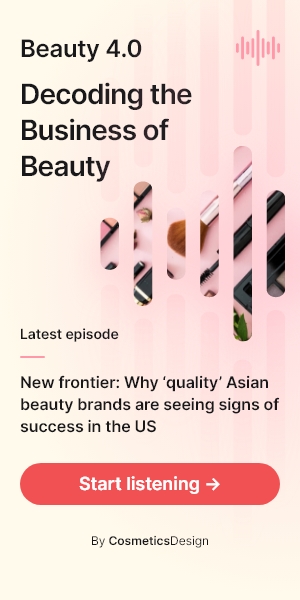Davos 2023: Beauty Kitchen founder wants to ‘elevate reuse message’ at World Economic Forum
![The World Economic Forum's 53rd annual meeting this month will bring together business leaders, governments and innovators from all over the globe to discuss the most pressing issues of the year [Getty Images]](jpg/beauty-kitchen-founder-jo-chidley-attending-world-economic-forum-davos-2023-to-talk-about-scaling-reuse-3.jpg)
Over the last several years, Scottish indie brand Beauty Kitchen had been scaling up and piloting its circular retail model ‘Re’ with a range of partners, including personal care giant Unilever and retail major Marks & Spencer. Developed as a business unit within Beauty Kitchen, the Re model offered brands and retailers standardised refillable bottles and refill stations in a bid to support wider sustainable change.
Last year, it secured €3.6m in funding from non-departmental government funding agency UK Research & Innovation to continue scaling and was also part of an accelerator programme under the World Economic Forum’s open innovation platform Uplink alongside 15 other global businesses.
Fast-forward a few months and, this year, founder Jo Childey had been invited to attend the 2023 World Economic Forum in Davos, taking place on January 16-20.
Taking ‘fringe’ business centre stage
Speaking to CosmeticsDesign-Europe, Chidley described feeling slightly awestruck by it all.
“It just feels a little bit odd because I’ve always seen what we do as, even with Beauty Kitchen if I take a step back, we’ve always felt more of a sort of fringe product line,” the founder said.
Taking the close-to-home Edinburgh International Festival as an example, she said her company’s Re model would slot better into the Edinburgh Festival Fringe that was dedicated to artists and acts considered more “unusual, slightly off-kilter and not mainstream”.
“…But, I think having the opportunity to talk about scaling reuse at a world event such as Davos just shows, I think, a big industry – not just the beauty industry but consumer products at large – that it is no longer a fringe science, it is something that should be mainstream. And it really needs to be mainstream,” she said.
Chidley would be at the World Economic Forum to run a session entitled ‘scaling reuse’ where the launch of a reuse portal would also happen, set up by the World Economic Forum, alongside major partners including WWF, The Ellen MacArthur Foundation and United Nations.
“This reuse portal is all around driving collaboration with young, innovative businesses that need to scale with businesses that have the problems, that are much bigger but have the resources – both financial and time,” she said.
‘There’s a whole industry and supply chain that can be fundamentally changed’
![Re has already proven successful in the UK at pilot-scale, it was now about mainstreaming the idea [Image: Beauty Kitchen/Re]](jpg/re_refill_station_circular_retail_2023-min-2.jpg)
Chidley said scaling reuse models like Re held enormous potential for industries worldwide, but even applying it just to the fast-moving consumer goods (FMCG) industry alone – a sector that created 161 million tonnes of packaging every year, less than 9% of which was recycled – would be momentous.
The world, and all its industries, had to get better at “resource management”, she said, particularly at a time when resources were scarce and increasingly under pressure. The “monoculture of single use packaging” had to be disrupted, she said.
“There’s a whole industry and supply chain that can be fundamentally changed, and that means, for me, that not only do we manage our resources better but we then, rather than making an industry obsolete, we help that industry change in a positive way.”
But shifting to circular models required a “whole infrastructure change” and depended on every part of the supply chain morphing – including the behind-the-scenes parts such as filling, and bulk transportation, she said. For a consumer brand to be truly circular, for example, it would not only require reusable consumer-facing products, but also reusable bulk-sized vats used in manufacturing and transporting, she said. And this, at scale, was no easy feat, particularly when most supply chains were set up for single-use products, she said.
“It’s about making sure you can facilitate the change while the scale-up happens. And that’s why it’s key to almost not go too big, too soon. With reuse, you almost need to have it where reuse is increasing and single use is decreasing and there has to be that kind of overlap, rather than switching one off and another on.”
Businesses ‘won’t solve this on their own’
Asked if there was corporate and industry appetite for such transformational change, Chidley said: “I think there is corporate appetite. I think there’s been a lot of talk over the last few years, and maybe a lack of action because these larger businesses want to de-risk.”
Change and innovation always carried risk, she said, and “coming out and being first” was also often also considered risky. But Re was trying to unravel all that, she said, bringing competitors alongside one another and offering a non-competitive platform of reuse bottles and retail concepts.
“We’re trying to be the independent conveyor of the brands and retailers; to bring them together because they won’t solve this on their own. And they would actually make the problem worse if they tried to solve it on their own, if everyone had different systems.
“…It has to be very active collaboration, whether it’s called a collective or consortium, it will be something like that that will come out for the reuse movement,” she said. “We need all stakeholders to make reuse work – to connect, to commit to a shared investment, shared risk, action and impact.”
Looking ahead, Chidley said scaling a model like Beauty Kitchen’s Re would also require smarter funding. Since its inception, Re had been self-funded by Beauty Kitchen, but the longer-term vision was to secure corporate venturing. “We want the stakeholders who have skin in the game,” she said.
And, under a corporate venturing model, she said it would be critical to have representation from all areas of the supply chain – manufacturers, packaging suppliers, brands, retailers, industrial cleaning firms etc. – to ensure the best and widest knowledge sharing possible.
Elevating the reuse message on the ‘world stage’
Coming back to Davos, Chidley hoped it would provide the opportunity to “elevate the reuse message” and “win some recognition” amongst attendees and global onlookers.
“I would love to live in a Utopian world where everybody places equal value on people and planet, but that’s not the world we live in. We still live in a linear economy where profit is the number-one thing everybody wants to talk about. If I can get that profit piece off the table quickly, we can get dealing with how to solve the problem.”
Chidley was grateful Uplink – designed to unlock entrepreneurial-driven positive, systemic change for people and planet – was helping lay wider foundations for all of this at the World Economic Forum.
“I suppose, talking about fringe science, Uplink is almost the fringe of the World Economic Forum. Because, generally, the World Economic Forum is your larger companies, government agencies, it’s your banks, it’s those world-renowned brands that you recognise, alongside some of the non-sustainable industries like oil and gas that are still there. Uplink is the open innovation platform that hopefully enables fringe businesses, like ours, to be on the world stage,” she said.

![The collaboration of beauty, ingredient and waste specialists has already developed four prototype products from upcycled coffee [Getty Images]](jpg/beauty-kitchen-unveils-coffee-colab-with-kaffe-bueno-bio-bean-revive-and-arcania-apothecary-for-upcycled-coffee-beauty-innovation.jpg)
![The European Commission (EC) is due to finalise its proposed ban on microplastics in cosmetics, with a 12-year transition period for certain nail, lip and makeup products [Getty Images]](jpg/microplastics-in-cosmetics-eu-ban-must-be-faster-says-ngo-plastic-soup-foundation.jpg)
![The open letter says the current microplastics ban proposal doesn't go far enough, with 'exceptionally long transition periods' for some categories, including leave-on nail products [Getty Images]](jpg/beauty-industry-writes-open-letter-to-european-commission-calling-for-swifter-microplastics-ban-in-cosmetics.jpg)
![The five companies have been recognised for their environmental leadership across climate change, forests and water scarcity - a status only 12 global companies achieved in 2022 [Getty Images]](jpg/cdp-a-list-2022-features-beiersdorf-firmenich-kao-l-oreal-and-lvmh-as-triple-a-scores-for-environmental-leadership.jpg)






![Chinese study highlights mental health challenges in atopic dermatitis, emphasising holistic patient care. [Getty Images]](jpg/chinese-research-linking-atopic-dermatitis-to-mental-health-underscores-need-for-holistic-care-2.jpg)








